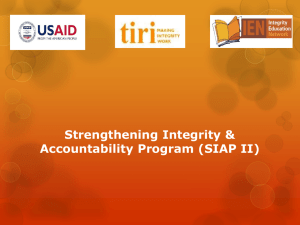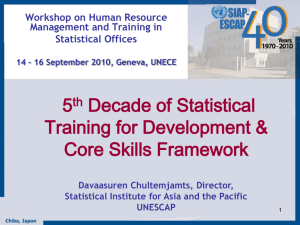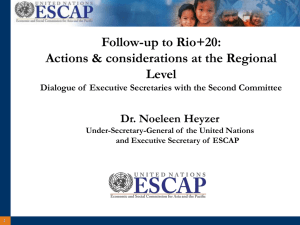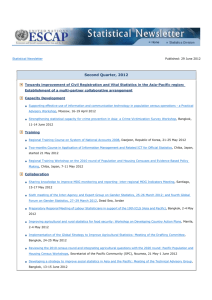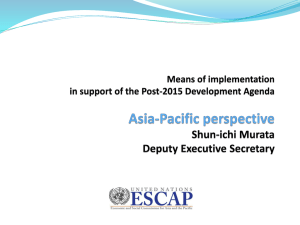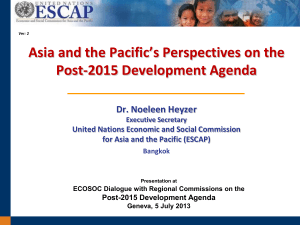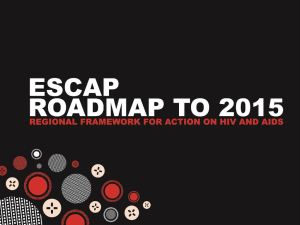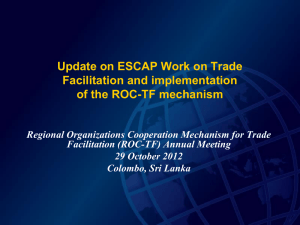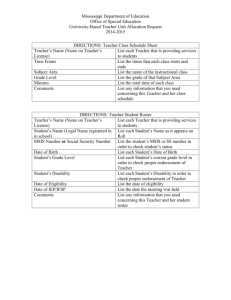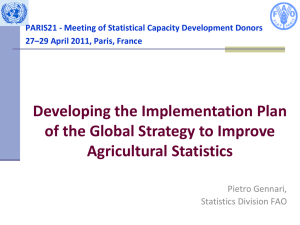Published: 30 June 2010 Second Quarter, 2010 Voice from the
advertisement
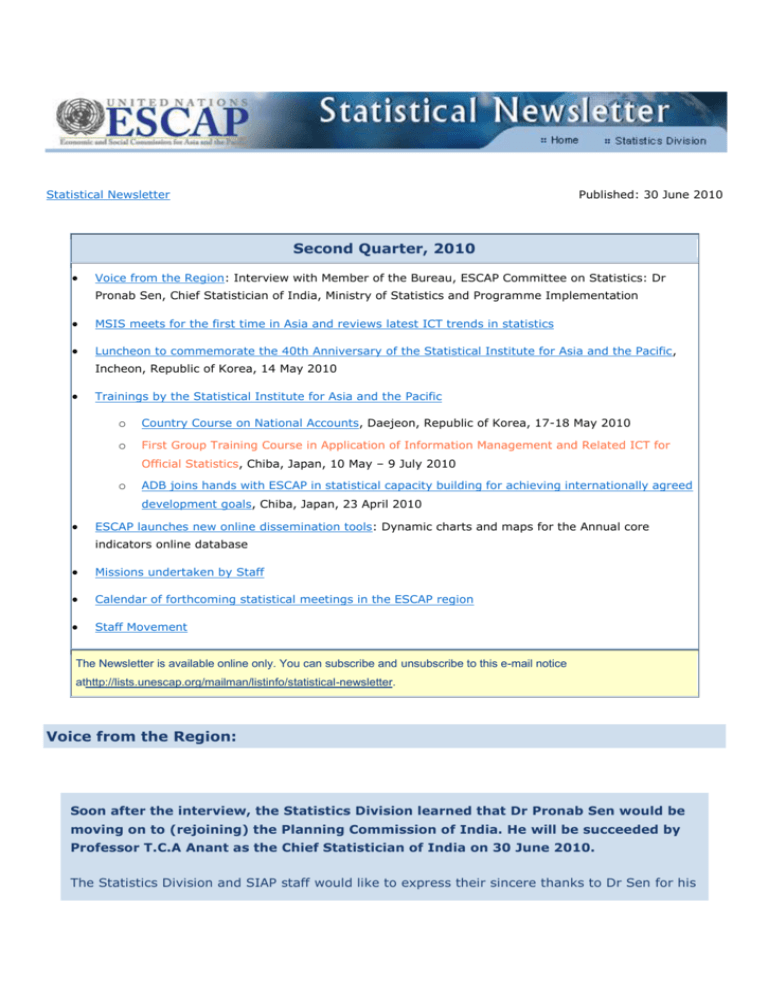
Statistical Newsletter Published: 30 June 2010 Second Quarter, 2010 Voice from the Region: Interview with Member of the Bureau, ESCAP Committee on Statistics: Dr Pronab Sen, Chief Statistician of India, Ministry of Statistics and Programme Implementation MSIS meets for the first time in Asia and reviews latest ICT trends in statistics Luncheon to commemorate the 40th Anniversary of the Statistical Institute for Asia and the Pacific, Incheon, Republic of Korea, 14 May 2010 Trainings by the Statistical Institute for Asia and the Pacific o Country Course on National Accounts, Daejeon, Republic of Korea, 17-18 May 2010 o First Group Training Course in Application of Information Management and Related ICT for Official Statistics, Chiba, Japan, 10 May – 9 July 2010 o ADB joins hands with ESCAP in statistical capacity building for achieving internationally agreed development goals, Chiba, Japan, 23 April 2010 ESCAP launches new online dissemination tools: Dynamic charts and maps for the Annual core indicators online database Missions undertaken by Staff Calendar of forthcoming statistical meetings in the ESCAP region Staff Movement The Newsletter is available online only. You can subscribe and unsubscribe to this e-mail notice athttp://lists.unescap.org/mailman/listinfo/statistical-newsletter. Voice from the Region: Soon after the interview, the Statistics Division learned that Dr Pronab Sen would be moving on to (rejoining) the Planning Commission of India. He will be succeeded by Professor T.C.A Anant as the Chief Statistician of India on 30 June 2010. The Statistics Division and SIAP staff would like to express their sincere thanks to Dr Sen for his support, friendship and valuable contribution to the region's statistical development. He has been a very active member on the Bureau of the ESCAP Committee on Statistics. We congratulate Professor Anant on his appointment and look forward to working with him in his new capacity. Interview with Member of the Bureau, ESCAP Committee on Statistics: Dr Pronab Sen, Chief Statistician of India, Ministry of Statistics and Programme Implementation 1. It has been over a year since you were elected by acclamation as a Member of the Bureau of the ESCAP Committee on Statistics, re-established after a seven-year gap. What is the single-most important result that you would like to see emerge from your tenure in the Bureau? The ESCAP region is witnessing the most rapid integration across its member countries it has ever seen, across a wide range of activities and functions – be it trade, investment, transport, movement of persons, and so on. More often than not, the stakeholders are bewildered at the pace of change and unsure of what they portend. The information base for tracking and guiding these processes have been long overtaken by developments – if we indeed even know what these information requirements are. I would like to see the Committee on Statistics, through the Bureau, evolve a minimum core of standardized statistical information which the member countries need to produce in order to assess and analyse the regional dynamics. I am of course aware that ESCAP does produce a significant volume of statistical data, but these are by and large more relevant for national decision-making purposes. 2. What do you see as the top priorities for the statistical development in the Asia-Pacific region and what role do you see the Bureau play in addressing these priorities? There are a number of priority areas, but let me mention just three which I consider the most important. First, there is little recognition that analysis of regional groupings, be it bilateral or multilateral, requires a different modeling framework than is used for intra-country analysis. This, in turn, requires a somewhat different data set. There is need to generate this awareness among policy-makers and analysts across the region so that the data requirements are articulated and NSOs are activated to produce them. Second, analysis of international capital flows and their impact on national economies are still at a nascent stage. The data base too is weak. This needs to be corrected as soon as possible. The East Asian crisis of the late 1990s and now the global financial crisis have brought into prominence this requirement, but I still do not see very much action. Finally, the ESCAP region contains a number of countries which are the most vulnerable to climate change in the world. Despite this, we have not even begun to work on the appropriate data bases for analyzing the implications of climate change on our countries and then on to our region. 3. How would you like to see the statistical community of the ESCAP region address those priorities (that you have identified in response to question 2 above)? Statistical systems are typically reactive in nature. The analytical framework is developed by other players and we react to the demands being placed on us. Nevertheless, I believe it is incumbent on us to engage actively with the policy makers to bring about an early recognition of the importance of statistics in carrying out these analyses. Policy makers need to be sensitized to the fact that useful statistical data cannot be generated at the drop of a hat. Typically a few years are needed to produce relevant statistics after the need is articulated. This is perhaps the most important role that the statistics community of the ESCAP region can play – engage with our national policy makers and get involved in the debates and discussions that are taking place in regional and international fora. 4. Turning to your own country, how do you see contributing in response to those challenges? The Indian statistical system has already started to move ‘proactively' in a number of areas. Recognising the challenges arising from the processes of regional and global integration, environmental degradation, climate change, etc:, we have begun the process of reorienting our data systems to provide some of the necessary information. This can of course never be perfect, since the analytical side has to contribute to it. But we are trying to do our best. More importantly, we have been constantly lobbying with policy makers to sensitise them to the need to articulate their data requirements as early as possible. We also try to be as active as possible in international debates and discussions in order to not only ensure that the recognition becomes wider, but also that the voice of developing countries is not lost. 5. What are the major challenges and opportunities before Indian Statistical System? The Indian Statistical System, like most other statistical systems in the world, was developed to meet the statistical needs of the government. In the Indian case, this demand was larger than in most other countries since we followed a strategy of centrally planned development right since independence. Data needs of planners is very demanding, and the international reputation of the Indian Statistical System is a result of our efforts to meet these. In the last two decades, India has evolved into a fully fledged market economy, but planning continues to play an important role in setting the over-all development strategy. As a consequence, the Indian Statistical System not only has to cater to the statistical needs of the planners, both in the Centre and in the States, but also to those of the private sector and civil society. This is both a challenge and an opportunity. Not only are the data needs of the non-governmental sectors significantly different from those of government, there are substantial variations within its components. Moreover, the analytical capacity of non-governmental organizations vary widely, and the danger exists that an ‘information divide' may be created unless careful thought is given to the manner in which data is processed and disseminated. However, if we are able to meet these diverse needs effectively, the status and role of the official statistical system in India should be established once and for all. 6. How is Indian Statistical System responding to the challenges and opportunities (cited by you in response to question 5 above)? We have a long history of user consultations while framing our work programme. We have broadened the ambit of such consultations to include other and newer stakeholders. This is not always easy, since quite often the new stakeholders are unable to clearly articulate their data needs. This requires a certain degree of sensitivity on the part of the official statisticians, which has to be deliberately inculcated. We have also started to actively engage with private data producers, especially to provide them with the expertise and experience that they lack. We consider this to be extremely important since it is becoming increasingly clear that the official statistical system will never be able to fully meet all stakeholder needs for statistics due to our resource constraints. The gaps will have to be filled by private providers, and it is our responsibility to ensure that they are empowered and encouraged to follow good statistical practices. We have not yet begun to tap private data sources to meet our own requirements, but I am sure that as we go forward and develop closer relationships with these agencies, a time will come when our confidence levels are high enough to formalize partnerships. In anticipation of that day, we have built in provisions for outsourcing of data in our Statistics Act. 7. In terms of statistical development, where would you like to see the Asia and the Pacific region in 10 years time? I would like to see the Asia-Pacific region emerge as an exemplar of statistical cooperation in a multilateral framework, where diverse countries coordinate their statistical activities to provide information which is critical for assessing and analyzing the dynamics of regional and sub-regional groupings without in any way compromising on their sovereign rights or national needs. A region where statistical cooperation is based on enlightened self-interest; where stronger systems support the weaker; and where experiences and research are freely shared. Such a process will inevitably lead to the emergence of a common and shared position on numerous statistical issues which are exercising the international statistical community. This will provide the region a platform on which to engage in the global statistical debates in a manner in which the specificities of the individual countries are integrated into a powerful unified voice. There is already a recognition that an “Asian model” of development is coming into existence, which is in some ways different from the “Western model”. We are not as yet very clear as to what are the corresponding differences that need to be embedded in the statistical framework. But doubtless these will emerge as we start the process of regional dialogue. 8. You are a very successful leader in the field of statistics. What is your advice for young statisticians on how to succeed in this field? I am not sure that I deserve to be called “a very successful leader in the field of statistics”. I was lucky to inherit a very robust statistical system with some very good statisticians manning it. My “success”, if it can be so called, lies only in that I gave them the head to go ahead with the innovations that they wanted to carry out. My personal learnings from this experience form the basis of the advice that I would give to young statisticians entering the field of official statistics – always remember that all official statistics, like accountancy, is about developing and establishing conventions which need to be followed rigorously. However, conventions can and should be challenged from time to time as circumstances change. Understand, therefore, the basis of existing statistical conventions and ask yourself whether they continue to remain valid and, if not, how should they be modified. In the rapidly changing world that we live in today, you will be surprised how quickly conventions can get invalidated. This is the true challenge and a source of real excitement. MSIS meets for the first time in Asia and reviews latest ICT trends in statistics Statistics Korea hosted recently the 2010 Meeting on the Management of Statistical Information Systems (MSIS) in their new Statistical Training Institute building in Daejon. MSIS is a forum for information technology officers of statistical offices to discuss new IT architectures, cutting-edge technologies, applications and cooperation. Many statistical offices from Asia, Europe and North America were represented by their chief information technology officers. The regular MSIS organizers, UNECE, Eurostat and OECD, were this time joined by ESCAP, which co-organized with Statistics Korea the session on issues for Asian statistical organizations and ways to increase international cooperation. Other sessions covered high-level architectures, data exchange technology, software sharing and innovations for statistical offices. The meeting was participated in by 26 countries, of which 12 were from the ESCAP region, and 9 agencies. Statistics Korea was a truly generous host by funding the air fares for ten Asian participants and contributing substantively to the meeting. Rich information source on cutting-edge technology MSIS documentation is one of the best ways to update one's knowledge on ICT trends in official statistics. All documents are posted on UNECE website at http://www.unece.org/stats/documents/2010.04.msis.htm. The official report of the meeting is available athttp://www.unece.org/stats/documents/ece/ces/ge.50/2010/crp.1.e.pdf. Below are some highlights from the Meeting. Many advanced statistical offices have adopted the Generic Statistical Business Processing Model (GSBPMwww.unece.org/stats/gsbpm) as a basis for their strategic IT development. They want to leave behind the era of developing statistical information systems in silos, which has led to a proliferation of standards and applications. The Australian Bureau of Statistics, for example, demonstrated that significant cost savings can be achieved in the long term by virtualisation of statistical computing (moving it to a “cloud” of computers), which architecture allows 24/7 uptime and highly flexible scalability of processing power. SDMX and DDI are gathering major momentum as standards for data exchange and data documentation, including in some developing countries. In that context, the Meeting noted that the evolution of related concepts of Semantic Web and Linked Data need to be kept in view, as the latter has emerged as a model to connect distributed data on the web. Interestingly, UNIDO's paper on R triggered one of the longest discussions: Several statistical offices have evaluated its use in statistical offices in the past, with the common conclusion that R code would be difficult to maintain as staff are not familiar with it and prefer to use commercial software (SAS, SPSS). However, many offices “allow” its use by methodologists and as plug-ins to other software. The situation might be changing, however, as young statisticians are increasingly R literate (see my paper's ultimate para). Share through the MSIS Wiki An important outcome of the session was that a number of additional Asian developing countries were exposed to the MSIS forum. They found the Meeting very useful and are more likely to attend MSIS in the future. An idea of a regular CITO forum for the Asian region was raised, but no tangible proposals were made to implement it. However, the traditional MSIS participants welcomed Asian future participation, including contributions to the MSIS Wiki forum at http://www1.unece.org/stat/platform/display/msis/Home+Page which is intended for intended for IT and related professionals working in national and international statistical organisations. The MSIS Wiki has developing content on statistical software sharing, which initiative is guided by an elected Software Sharing Advisory Board. UNECE has compiled and started posting on the Wiki an inventory of shared software which will be periodically updated. All participants, including from Asia and the Pacific, were encouraged to start sharing information about the software tools and applications that they might want to make available for others. Luncheon to commemorate the 40th Anniversary of the Statistical Institute for Asia and the Pacific, Incheon, Republic of Korea, 14 May 2010 The Statistical Institute for Asia and the Pacific (SIAP) has now been helping the countries of the Asia-Pacific region develop the necessary technical skills to gather high-quality statistics for national development planning for 40 years. To commemorate this anniversary, Dr Noeleen Heyzer, the Executive Secretary of the economic and Social Commission for Asia and the Pacific (ESCAP) – of which SIAP is a subsidiary - hosted a luncheon for the heads of member State delegations at the ESCAP 66 the Commission session. “Today, we are here to celebrate the enormous achievements made by SIAP during the last four decades,” said Dr Heyzer at the lunch. “Driven by the spirit of friendship and mutual cooperation, the Institute was shaped to work for development of statistical capability and human resources. I am sure the Institute should continue to carry out the task stipulated by its founders.” The SIAP was established in 1970 to mitigate the critical shortage of trained official statisticians in most of the developing countries in Asia and the Pacific as well as in regional and international statistical training facilities. Since then, through SIAP's training programs – which to date has trained about twelve thousand statisticians - many developing countries in the region have improved their technical skills in statistics. “It was a wonderful experience,” said Jirawan Boomperm, Director General of the Thai National Statistical Office and an alumnus of the course. “It was my inspiration towards pushing forward the Thai National Statistical Office to keep pace with the countries with higher level statistical development.” Dr Heyzer discussed how SIAP has in the past four decades developed into a premier statistical training institute and, by providing practice-oriented training to official statisticians, has earned the reputation for contributing to socio-economic development. It now plays a pivotal role in capacity building for official statistics as the training arm of ESCAP, which, as a part of its mission of supporting the member States in their development processes, accords very high priority to human resource development for bridging the existing gaps in official statistics. “National statistics provide an objective perspective of the changes taking place in national life and allow comparisons between periods of time and geographical areas,” said Brian Pink, head of Australian Bureau of Statistics, in his key note address. “SIAP has greatly helped strengthening the official statistical systems of developing countries and disadvantaged economies in transition by imparting practically oriented training of official statisticians.” Ms Davaasuren Chultemjants, Director of SIAP, briefly discussed the institutes plan on how to meet the growing demands for statistical training, with the limited resources at its disposal. “With more and more countries realizing the critical importance of statistical information in formulating and monitoring their development policies, the need for training of their official statisticians is being felt more than ever,” said Ms Chultemjants. “While SIAP will fulfill all of its current training needs, we must call upon our member States for greater support in order for the institute to meet the growing needs throughout the region. We must not let the growing recognition for trained statisticians go unanswered.” Ms In Sill Yi, Commissioner of Statistics Korea, pledged to work together with SIAP and cooperate with other nations in the area of statistics. Mr Kazuhiko Matsuo, Director for International Training Cooperation, Ministry of International Affairs and Communications, Japan expanded on this idea. “I would like to make a most cordial acknowledgment to the countries in the region having growing ownership awareness to SIAP,” Mr Matsuo said. “The recent increasing cash and in-Kind basis contributions to SIAP by many developing countries in the region represents a good deal of excellent countries' efforts.” Besides the heads of State delegations, the luncheon was attended by eminent official statisticians of the region and other distinguished guests. Some of the alumni of the Institute, who at present hold high official positions in national and international agencies, also attended the lunch. Trainings by the Statistical Institute for Asia and the Pacific Country Course on National Accounts, Daejeon, Republic of Korea, 17-18 May 2010 The Statistical Institute for Asia and the Pacific (SIAP), in collaboration with the Statistics Korea, conducted the Country Course on National Accounts for the government statisticians of Republic of Korea on 17th and 18th May 2010. As requested by Statistics Korea, the course was designed to cover the basic framework of national accounts as well as some of the more advanced topics of applications. The main objective of the course was to help trainees and to: i. provide a clear idea of the basic concepts of national accounting framework, particularly to the fresh-recruits; ii. make the participants aware of the concepts and compilation procedure of Supply-Use Tables & Input-Output Transaction Table and iii. discuss use of business accounts data for compilation of national accounts. The training course is expected to help the officials of the Regional Accounts & National Wealth Team of Statistics Korea in improving the national accounts statistics both at the national and regional levels. The participants were selected by the Statistics Korea. It was a mixed group of experienced and freshly-recruited officials engaged in compiling regional (sub-national) national accounts aggregates. Statistics Korea is well advanced in compilation of their national accounts - both at the national and regional levels. The experienced officials therefore were well conversant with the concepts and advanced / good practices of compiling the accounts. The new recruits were however in want of an overview of national accounting framework and the basic concepts. A total of 23 participants from the Regional Accounts & National Wealth Team of Statistics Korea participated in the training course. The discussions and the issues raised by the participants indicate that at the one hand the new recruits got a chance of getting familiar with concepts and definitions of national accounts and at the other the experienced officials could raise the problems they face in compilation of regional accounts and discuss the possibilities of improving upon the present practices. In spite of the diverse level of exposure to national accounts, most of the participants (77 %) stated that the course level was just right. The course content was found very useful by about a third of the participants. But, about 60 % of the participants found the duration of the course too short. One even commented that the topics covered during the course need at least 5 days of detailed discussion. All participants thought the course was relevant to their work. The course materials/handouts, and presentation techniques were assessed positively by the participants, rating them either ‘very good' or ‘good'. First Group Training Course in Application of Information Management and Related ICT for Official Statistics, Chiba, Japan, 10 May – 9 July 2010 First Group Training Course in Application of Information Management and Related ICT for Official Statistics begins in Chiba, Japan on May 10, 2010. The course will be conducted for 2 months from 10 May to 9 July 2010 and is jointly organized by the Statistical Institute for Asia and the Pacific, SIAP, and the Japan International Cooperation Agency, JICA. This course aims to equip participants with different aspects of ICT to increase productivity in all phases of the operations of their national statistical organizations. Emphasis will be placed upon production, analysis and dissemination of official statistics, and to understand the possible implications upon adoption of such technology. This course brings together 22 participants from 14 countries namely, Armenia, Azerbaijan, Cook Islands, India, Ethiopia, Kosovo, Rwanda, Solomon Islands, Samoa, Sri Lanka, Tajikistan, Thailand, Uzbekistan, Vietnam. The main objectives of this course are three-fold. First, participants will be trained on the principles of electronic data processing, management and dissemination, and the technologies available for data processing including the use of statistical software like the Census and Survey Processing System (CS Pro). Second, participants will be equipped with necessary knowledge and skills to become trainers so that they would be able to train other staff members in their organizations upon completion of the training. Third, participants would share experiences in the use of ICT for statistical operations and build informal networks among professionals. The course contents include the topics on Information architecture of national statistical system, data capture and processing, statistical database, data dissemination and micro data access, data analysis techniques and software including STATA and R software, training of trainers and Japanese ICT experience. One of the course components is the project work where participants, either individually or jointly, will perform. They will present the results of their work towards the end of the course. This work is expected to be complemented by the preparation of an action plan which will be implemented upon the return to respective countries. Several field visits also have been included to Japanese government statistical organisations and advanced IT companies, and to observe work at distance prefecture in Japan relating their work on the use of ICT in the statistical system. The work is progressing with full attention and participation of the trainees. ADB joins hands with ESCAP in statistical capacity building for achieving internationally agreed development goals, Chiba, Japan, 23 April 2010 The recent global economic crisis poses an unprecedented threat to development that is negatively affecting the MDGs achievement so far made by member States. The convergence of these threats has exacerbated an already difficult situation for many countries, particularly the LDCs, LLDCs and several SIDS. Persistent weaknesses in the availability and quality of MDG related data and statistical capacity in many developing countries are major constraints in developing and implementing pro-MDG policies and programmes. The three week training workshop on Analysis, Interpretation and Dissemination of Official Statistics, which was jointly organized by the United Nations Statistical Institute for Asia and the Pacific (SIAP), ESCAP's training arm in statistics, and the Asian Development Bank (ADB) through its Development Indicator and Policy Research Division in the Economic Research Department, concluded on April 23, 2010 at SIAP in Chiba, Japan. Fourteen statisticians from developing member countries in the region namely Afghanistan, Cambodia, Lao PDR, Maldives, Mongolia, Nepal, and Timor-Leste have improved their knowledge and skills in producing and analyzing statistical data relevant for monitoring progress of MDGs. This specialized workshop comprised several components on social statistics to complement the Institute's Tokyo Metropolitan Area (TMA) based group training courses. The training workshop introduced the standard techniques and methodologies of generating good quality indicators, analysis and interpretation of data to monitor the progress made over time on the human development and the achievement of MDGs. There were ample opportunities for all participants to explore the relevant subject areas, through discussion on various issues, and sharing of country experiences in the compilation, analysis, interpretation and dissemination of social statistics. The workshop curriculum covered the following topics as Poverty, Education, Health, Gender, Labour, Environment Statistics under the umbrella of MDGs. In addition, the course included sessions on survey data analysis, report writing and presentation of results. Towards the end of the course, participants carried out project work in groups using their own country data to practice what they learnt during the classroom sessions. They made presentations on their findings before the faculty members of SIAP and received feedback on how to improve on their work. SIAP and ADB will work together to foster the statistical capacity building of the countries in the region through similar collaborative efforts. SIAP has successfully conducted five Country Training Workshops on ‘MDGs and Use of Administrative Data Systems for Statistical Purposes' jointly with ADB under RETA6356 project in 2008. The present workshop can be seen as a continuation of the effective collaboration between two agencies. ESCAP launches new online dissemination tools Dynamic charts and maps for the Annual core indicators online database The Statistics Division has made available on its website a set of tools that help visitors create tables and dynamic charts and maps from the ESCAP database of development indicators. It is hoped that the tools broaden the use and understanding of statistics among all types of data users. Please visit and test at:http://www.unescap.org/stat/data/swweb/ Your feedback is most welcome. Missions undertaken by Staff Margarita F Guerrero, Senior Statistician, Statistical Development and Analysis Section Bangkok, Thailand, 28-30 June 2010: Gave a presentation at the Regional Workshop on Monitoring and Assessing Progress on Decent Work in Asia on informal employment statistical definitions and their operationalisation through the ‘1-2' survey piloted by eight countries under the United Nations Development Project on Interregional Cooperation on the Measurement of the Informal Sector and Informal Employment and the Asian Development Banks RETA 6430 on Measuring the Informal Sector. This technical meeting, organized by ILO, brought together participants from the ministries of labour, statistical offices, workers organizations and employers organization to exchange experiences on the measurement of decent work under substantive areas of the ILO Decent Work Agenda. Quezon City, Philippines, 16 – 17 June 2010: Served as course instructor on the topics of time-use statistics and informal employment statistics for the 8-day First Regional Intensive Training Course on Gender and Macroeconomic Issues. The course, co-organized by UNDP, Asian Institute of Technology, Miriam College, International Working Group on Gender, Macroeconomics and International Economics, and Development Alternatives with Women for a New Era, was designed for economists/practitioners in government, development agencies, civil society organisations, research institutes and the academia. The course aimed to provide about 40 participants from 17 countries with knowledge and tools to analyze, design and implement gender-responsive macroeconomic policies and plans. Hanoi, Viet Nam, 6-7 May 2010: At the International Conference on Informal Sector and Informal Employment organized by the Vietnam Academy of Social Sciences and Institut de Recherde pour le Developpement, presented on “1-2” Surveys for Estimating Informal Employment and Valued added of Informal Sector Enterprises and served as chair discussant for a session featuring six papers on national experiences of Cameroon, Peru, Sri Lanka and Morocco in compiling national accounts for the informal sector. Mr Artur Andrysiak, Statistician, Statistical Development and Analysis Section Dalian, China, 21-25 June 2010: Participated as a resource person/expert in the Workshop on Industrial Statistics jointly organized by the United Nations Statistics Division/Department of Economic and Social Affairs (UNSD/DESA) and the National Bureau of Statistics of China (NBS). The workshop was part of a series of events organized under the project on strengthening statistical capacity development in China and other developing countries funded by the Chinese Government. The workshop was attended by experts from: Bangladesh, Canada, Hong Kong, India, Indonesia, Macao, Malaysia, Mongolia, Pakistan, Philippines, Singapore, Thailand, Viet Nam as well as representatives from the National and Provincial Bureaus of Statistics of China, UNSD, UNIDO and ESCAP. The purpose of the workshop was to discuss with the participating countries the good practices and the latest international recommendations related to the area of industrial statistics including index of industrial production (IIP), capacity utilization, business conditions surveys and seasonal adjustment methods and practices. The workshop provided an overview of the International Recommendations for Industrial Statistics 2008 and the recently endorsed International Recommendations for the Index of Industrial Production 2010 as well as offered an opportunity for the participants to share their experiences in these areas and discuss the implications of the UN recommendations on their collection and compilation practices. In addition to being a resource person/expert for the workshop, Artur presented on the topics related to seasonal adjustment methods and practices including seasonal adjustment of the IIP. Mr Ilpo Survo, Chief, Statistical Information Services Section Daejon, Republic of Korea, 26-29 April 2010: Represented ESCAP at the UNECE/OECD/Eurostat Meeting on the Management of Statistical Information Systems. See a separate article in this Newsletter. Eric Hermouet, Statistical Information Systems Officer, Statistical Information Services Section Delhi and Jaipur, India, 26-30 April 2010: Participated in the DevInfo 2010 Field Reference Group Meeting. The meeting reviewed a number of new software applications developed on the basis of the DevInfo technology such as CensusInfo, DevInfo Analyzer, CRINGInfo. The meeting also reviewed a soon to be launched open source version of the DevInfo database system. Further information on the statistical data dissemination solution can be found at www.devinfo.org. Mr Jan Smit, Regional Adviser on Statistics Yangon, Myanmar, 24-25 March 2010 and 9 April 2010: Provided statistical and strategic advice to the post-Nargis Periodic Review IV process. This Review, aimed at monitoring and evaluating the process and progress of the recovery of the areas of Myanmar affected by the cyclone Nargis of May 2008, is the last in a series conducted under the mandate of the Tripartite Core Group (TCG) of ASEAN, the Government and the United Nations. Siem Reap, Cambodia, 25-28 April 2010: Represented ESCAP, and acted as a resource person, at the twenty-third session of the Asia and Pacific Commission on Agricultural Statistics (APCAS). During the session ESCAP presented a paper on its role in statistics development in Asia and the Pacific, which paid particular attention to possible synergies between ongoing efforts led by FAO to revitalize agricultural statistics at the global and regional levels and the Regional Programme for the Improvement of Economic Statistics that ESCAP is in the process of developing. Sharita Serrao, Associate Statistician, Statistical Development and Analysis Section Pattaya, Thailand, 5-7 May 2010: Participated as resource person at the Regional Consultation and Strategic Planning Meeting on the development of training modules to strengthen statistical capacity in monitoring EFA organized by UNESCO Institute for Statistics - Assessment, Information Systems, Monitoring and Statistics Unit (UIS - AIMS), Bangkok. This was the second expert group meeting organized by UIS-AIMS on the subject. Two draft training modules have been developed by UIS-AIMS to strengthen capacities to monitor EFA following the first EGM held in July 2009. The first set of modules, Module A, addresses issues pertaining to school record management including collection, analysis, dissemination and use of school data. Module A is designed for education administrators at all levels and school managers. The second set, Module B, addresses how to access, analyse and make full use of education data from population census and household surveys using statistical software/package, and this module is designed for education researchers, analysts, administrators and statisticians. After the organization of two users-review workshops on the training modules, the objective of this second expert group meeting was to gather further comments and inputs from experts from the education sector as well as from statisticians in order to finalize the draft training modules, and to discuss further collaborative activities to systematically disseminate and utilize the training materials. This was an opportunity for ESCAP to also gather knowledge and insight on the development of training materials/curricula on indicators for monitoring MDG progress in view of the sub-regional training courses to be designed and conducted by SIAP under the development account project on supporting MDG-based development strategies through integrated regional action being implemented by ESCAP in collaboration with ECE. Harumi Shibata Salazar, Associate Statistician, Statistical Information Services Section Helsinki, Finland, 6-7 May 2010: Participated in the conference on Data Quality for International Organizations organized by Eurostat, UNCTAD and UNSD. The purpose of the conference is to provide experts in the area a forum to debate data quality issues and exchange experiences related to the processes adopted in order to improve the collection and dissemination of data, this year specifically focused on the progress, development and improvement of the quality assurance frameworks in countries and the identification of areas where international organizations could support their processes. The countries considered that international organizations could help national initiatives on quality in different aspects that vary from the establishment of standards and benchmarks on collection and reporting of data and defining criteria of successfulness to the organization of trainings and the promotion of the involvement of stakeholders and better coordination among institutions in the countries. Calendar of forthcoming statistical meetings in the ESCAP region The calendar of all international meetings related to official statistics in Asia and the Pacific is maintained athttp://www.unescap.org/stat/meet/events_Asia_Pacific.asp Date Organizer Meeting Venue 2010 6 - 9 July ESCAP/SD Workshop on the analysis of the cognitive and pilot tests results in the context of disability statistics Bangkok SIAP-JICA Distance-learning Training Course on 7 July SIAP “Introduction to the System of National Accounts (SNA)” for Afghanistan, China, India, Mozambique and Philippines Chiba, Japan http://www.unsiap.or.jp/ Regional Training Course on Genderizing Population and 12 - 16 July SIAP Housing Census Chiba, Japan http://www.unsiap.or.jp/ 14 - 16 July 20 July - 17 September 26 July - 24 September 31 August - 2 September 31 August ESCAP/SD Supporting effective use of information and communication Novosibirsk, technology in population census operations - Needs Russian assessment workshop Federation 1st Group Training Course in Analysis, Interpretation and SIAP Use of Official Statistics (Economic Statistics) Chiba, Japan http://www.unsiap.or.jp/ Area-focused Training Course in Integrated Economic SIAP Statistics, including SNA, for Central Asian Countries Chiba, Japan http://www.unsiap.or.jp/ 9th Management Seminar for the Heads of NSOs in Asia and SIAP the Pacific Tokyo http://www.unsiap.or.jp/ SIAP Celebration ceremony for the 40th Anniversary of SIAP http://www.unsiap.or.jp/ Tokyo Expert group meeting on data analysis for poverty reduction 3 days in September ESCAP/SD and other related pro-MDG policies, including gender equality Bangkok http://www.unescap.org/stat/ 5 - 8 October 18 - 22 October October UNSD, ESCAP/SD UNSD-ESCAP Regional Seminar on Census Data Dissemination and Spatial Analysis http://unstats.un.org/unsd/census2010.htm Sub-regional Course on Measuring and Improving Survey SIAP Quality http://www.unsiap.or.jp/ SIAP Bangkok SIAP/JICA Distance-learning Training Course http://www.unsiap.or.jp/ Hong Kong, China Chiba, Japan October SIAP SIAP/JAXA e-learning Training http://www.unsiap.or.jp/ Chiba, Japan Regional Training Course/Workshop on Population Census October SIAP Data Analysis Using REDATAM Chiba, Japan http://www.unsiap.or.jp/ October December Research-based Training Course (through e-mail SIAP http://www.unsiap.or.jp/ 22 - 26 ESCAP/SD, November UNWTO 29 November 2 December November communication) China UNWTO Statistics Capacity-building Programme for Asia http://www.unescap.org/stat/ Bangkok http://www.unwto.org Commonwealth 15th Conference of Commonwealth Statistician Secretariat http://www.thecommonwealth.org SIAP Hong Kong, Regional Training Workshop on Census Communication http://www.unsiap.or.jp/ Delhi Chiba, Japan 1st Group Training Course on Production and Development November March 2011 SIAP of Official Statistics in support for National Development including the Achievement of MDGs Chiba, Japan http://www.unsiap.or.jp/ 14 December Regional coordination of technical cooperation activities in ESCAP/SD official statistics Bangkok http://www.unescap.org/stat/ Sixth session of the Governing Council of the Statistical 13 - 14 December ESCAP/SD, SIAP Institute for Asia and the Pacific http://www.unescap.org/stat/ Bangkok http://www.unsiap.or.jp/ 15 - 17 December ESCAP/SD December SIAP December SIAP Second session of the Committee on Statistics http://www.unescap.org/stat/ Research-based Training Course http://www.unsiap.or.jp/ Country Course on Census Communication http://www.unsiap.or.jp/ Please note that PARIS21 is maintaining event calendars for Africa and Asia athttp://www.paris21.org/pages/events/all-events/list/ Bangkok Chiba, Japan Staff Movement Mr Igor Uliyanov has joined ESCAP Statistics Division as Statistician on a temporary contract bases in the Statistics Information Services Section, effective 28 May 2010. He is coordinating preparatory work for an inaugural workshop of the technical cooperation project “Supporting effective use of information and communication technology in population census operations”. Prior to joining ESCAP, Igor worked at the Federal State Statistics Service of Russia (Rosstat) for 25 years. In 2004-2009 he was the Deputy Head of Rosstat, responsible for Economic Statistics and Energy Statistics. Igor has a solid macroeconomics background, in 2001-2004 served as macroeconomic advisor to the national Commission for the Securities Market. The degree of Doctor of Economic Science was conferred upon him by the Higher Attestation Commission of the Russian Federation in 2007. http://www.rcb.ru/rcb/2006-24/8059/ http://chief.viperson.ru/wind.php?ID=261340 Copyright (c) 2013 ESCAP | Legal Notice
